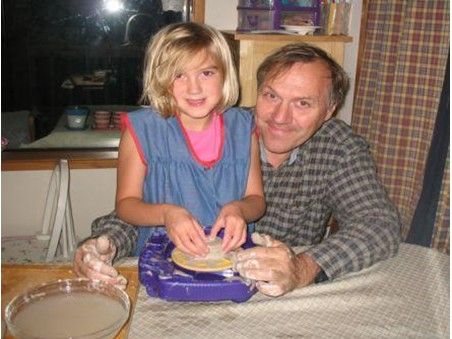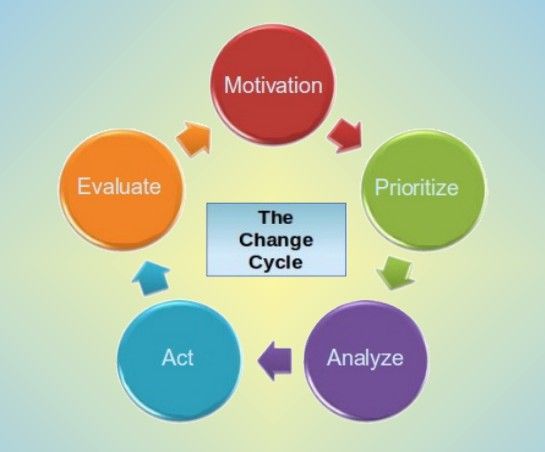
My daughter does not like messes. But she now loves Arts and Crafts because she was willing to give it a try. We all have a tendency to avoid problems because things might turn out to be messy. But unless we are willing to risk trying, problems are likely to get worse rather than better. We are limited in our ability to learn by our attitude toward change. It is common to think that change is risky therefore change is fearful. We might also think that change is work therefore change should be avoided as much as possible. Change means acknowledging that we are not “already perfect”. If we admit to a need for change we may think there is something wrong with us and take it as a blow to our ego or self-esteem. But if you are ever going to solve problems, we need to get past our fear of change and learn to boldly go where no team has gone before. The following is information on change models and how we can overcome bad habits and learn to embrace change.
We are limited by what we do not know or understand. We understand by experiencing and explaining. How we learn is by changing and growing. Learning is related to changing, growing, freedom and happiness.
Changing what we think (about avalanche assessment)
Changing how we feel (about fear, listening, etc.)
Changing our habits (about trip planning or navigation)
Change means “letting go” of past attitudes and beliefs. While these past attitudes may now be self-defeating, at an earlier point in your life (childhood?) they were useful and helped you survive. Because they once had a strong positive value for you, you are naturally fond of them and will subconsciously resist any effort you make consciously which would threaten them or (heaven forbid) change them or get rid of them.
Change means learning new things. If you have low self-esteem (or have failed in past learning attempts) you may believe you are incapable of learning or change.
Learning, growth and change all begin with a recognition of a personal need to change or learn. Learning is most easily done when you have a clear reason or motive to learn firmly in your mind. You will learn best and fastest that which you really want to learn.
i) What is your own personal motivation?
ii) What occurred that made you aware of the need to learn or change?
iii) Why have you decided you need to learn something?
iv) What do I want to do?
v) What do I need to learn in order to do what I want to do?
vi) How can I best learn what I need to learn?
CHANGE MODEL
Because change in both you and your environment, you can make change work for you by trying to anticipate changes and prepare for changes with a positive mental attitude.

II. Committing the time and effort needed to learn.
1) Work on overcoming fear (see separate hand-out). Avoidance of any task is often related to fear of your ability to complete the task. Tell yourself that you are interested in learning and growing and do not want to be fearful of it. Give yourself permission to be less than perfect. You may not do as good a job at the task at hand as someone else but you want to try and will do the best you can. Anything you do will be better than doing nothing at all (avoidance).
2) Finding the time. Prioritize your schedule. What activities are most important to you?
What activities or commitments have you made that are less important to you?
What activities are you currently doing which you could put on hold for a while in order to make time for learning (for example, which would you really rather do with your free evening ... See that new movie that just came out or go to the library and study? Okay, let me rephrase that: In the long-term scheme of things, which would benefit your life the most? All of us have several hours a week that we use on stuff like watching TV, reading newspapers, reading “junk” novels, arguing with our spouses, children or parents, mowing lawns, washing cars, etc. While we learn from these activities, much of the time is spent being “passively” entertained. William Blake once wrote, “You can’t kill time without injuring eternity.” While entertainment and relaxation are important goals, you should try to balance these activities with time set aside for learning and growth. You will be more likely to maintain this over time if you
3) Establish goals and rewards.
i) Begin by analyzing your needs and prioritizing
ii) Keep both the goal and the reward specific. With difficult goals, keep breaking them down into simpler and simpler goals until each can reasonably be achieved in an hour or two. Then reward yourself after you have successfully completed each phase!
iii) Keep the task within your ability. Avoid “Mission Impossible” stuff (or break it down until it is possible).
iv) Keep the reward
(i) Within your means financially (I use going for a five-minute walk as a reward).
(ii) Something you enjoy.
(iii) Something immediate, not delayed until later.
Other examples of small rewards:
For every hour I spend researching this topic, I will spend 10 minutes playing my guitar.
When I get this section done, I’ll have a graham cracker and glass of juice.
v) When you achieve a MAJOR goal, celebrate in a MAJOR way!
(i) Tell your friends and family what you have done (call them).
(ii) Tell yourself, “I did great!” Give yourself a pat on the back.
(iii) Avoid any self-criticism. Even minor criticism can be defeating at this point.
4) Time Management Techniques
i) Plan ahead ... use a monthly, yearly calendar.
ii) Prioritize tasks ... Daily list ... Most important to least (i.e., not easiest to hardest). ... Weekly list
iii) Avoid “over-scheduling.” Just Say No (politely of course).
iv) Use your personal “prime-time” (when you are thinking best or have few distractions) to do difficult tasks.
III. The learning phase (Research and Development).
Learning, itself, can be broken down into several separate steps. Some common steps include
1. Preparing to Learn.
2. Acquiring Knowledge.
3. Organizing Knowledge.
4. Applying New Knowledge - Teaching.
5. Analyzing Knowledge.
6. Synthesizing or Using New Knowledge to Produce Something New.
1) Preparing to Learn
You will not learn well if you are tired, hungry or cold. Making time for learning includes making time for sleep, food, water and warmth prior to learning. You will also not learn well if you are distracted, fearful, stressed-out or suffering from low self-esteem, fear or self-criticism. You will learn more efficiently if you can deal with these issues prior to attempting to learn other things.
2) Acquiring Knowledge
Different people learn new things in different ways. Some people learn from books. Others from doing. Still others from demonstrations or watching others. Try a multitude of different ways. Use a multitude of sources of information. I personally learn a lot from books. My standard “method of learning” consists of
i) Budgeting the time to prepare what I am going to learn (or teach). This for me is the hardest step. Allowing enough time is the key here. The more time you can allow to your task, the less stress you will put yourself under, and the more successful you will be at learning. Preparation may be the key to success, but time management is the key to preparation.
ii) I go to the library and/or local bookstores.
iii) I look at the titles of 20 to 30 relevant books and choose about 8 that look like the most relevant to what I want to learn.
iv) At a table, I will spend about 5 minutes or less skimming over each book. I read the Table of Contents, possibly the Introduction and the first part of one or two key chapters.
v) I pick 2 or 3 books and check them out (or buy them). From each, I read and take notes on 2 or 3 chapters.
vi) I will often “sit in” on many courses being offered by various colleges and clubs here in King County ... always with pen and paper in hand. I always take notes, trying to organize the presentation on paper for later review.
vii) I will also read magazines and file “intelligently” written articles by specific categories in a 4-drawer file I have at home for later reference.
Acquiring knowledge is an active process! Learning is more than just reading, listening, watching and taking notes!
i) Learning means challenging and searching ideas, premises, logic; actively thinking about the topic as you read or listen, pen in hand and note paper ready, not only to write down the book or teacher’s ideas--but also YOUR IDEAS and thoughts that come to you as you are reading or listening.
ii) Whatever your resources of information, try to focus on (write down, underline or highlight) key phrases such as “there are four things to remember about acquiring knowledge.”
iii) Make notes rather than take notes. Prioritize what to write down, organize the material, understand your notes or, if you do not understand the material, either ask your question (if a class) or write down your questions (if you are reading).
iv) Learning means being prepared for class (or library) in advance--being ready to sort ideas, prioritize and seek out main points to note--in order to come up with your own structure of what is important and what you should strive to remember.
3. Organizing Knowledge
1) Beyond self-motivation, you should ask yourself
i) What is the purpose for doing this?
ii) How can I relate the new skill to what I already know (my past)?
How can I fit the new theory into the framework of what I already know.
iii) How can I relate the new, specific knowledge to the bigger picture (the world around me)?
iv) How can I summarize my new knowledge?
v) What can I use as a “hook” to help me remember the new knowledge.
2) Work hard as you learn. Learn with “emotion.” Challenge new ideas ... Is this really a good idea or is this a bunch of nonsense?
3) Work toward understanding a subject or mastering a skill (versus just memorizing a few facts). Knowing a lot about a little is better than knowing a little about a lot.
4) Listen or read attentively and actively. Always be expecting the nest sentence to be the “most important revelation of your life.” Okay, so maybe that’s exaggerating things a bit, but actively expect to learn and you will learn better.
4. Applying/Analyzing and Synthesizing New Knowledge.
Whenever you learn something new, you need to transfer the information from your short-term memory to your long-term memory. The most effective way to do this is to use your new information to create something. Using your new knowledge can include practicing a skill or attempting to explain your new knowledge to someone else. Teaching others is not really the best way to learn. It is, however, the best way to retain new information, not only because it forces you to truly, actively understand what you are trying to teach, but also because it forces you to use what you are trying to teach.

